South Africa’s citizens are seriously concerned about the state of their national government
In most surveys of African governance South Africa appears as one of the best governed countries. Within South Africa, however, the picture is somewhat different. There is a high level of criticism of the executive, complaints that the legislature has been relegated to a minor position and much dispute over the role of the judiciary.
In addition many public institutions appear to be in a state of almost permanent crisis. This is true of the public broadcaster, the South African Broadcasting Corporation; of the National Prosecuting Authority; of the Post Office; South African Airways; the national oil company, PetroSA; the national power utility, Eskom and various other parastatals.
All of this has caused considerable public concern. In recent years the country has seen much social unrest and public protest, including disruptions in parliament, a student incursion into the parliamentary precinct, a series of student protests and a large march through Johannesburg to the Johannesburg Stock Exchange, as well as a continuing rhythm of service delivery protests.
We decided to test public attitudes towards key aspects of governance by including a number of questions in the Markdata Omnibus Survey of September 2015*. This survey consisted of a fully representative national sample of 2,245 respondents, weighted by race, gender, province and other key variables. The survey was conducted between 24 August and 30 September, at a time of some national disillusion provoked in particular by the decline of economic growth and the consequent rise in unemployment.
It was immediately clear that the public mood was sour and difficult.
* KPMG has agreed the statistical information in this report to the Markdata summary tables
Many of Markdata’s interviewers were threatened while attempting to ask questions. Indeed one municipal councillor phoned up the head of Markdata and threatened her because he resented Markdata having come into “his” area to ask questions. Often it was clear that some public representatives and party officials were in extremely defensive moods, as if conscious of their own deficiencies. They expressed extreme resentment towards anyone asking “awkward” questions.
Everywhere, interviewers reported that there was greater sensitivity to survey questions than had been observed before. Questions that would previously have passed without comment now elicited querulous comment and disputation. In many cases interviewers felt they were encountering paranoia. In some cases, police had to be called to escort interviewers out of situations where their questioning had put them in situations of physical risk.
According to Markdata, such difficulties have not been confronted by interviewers in South Africa since the difficult days of the early 1990s when political tensions and violent conflict between the African National Congress (ANC) and the Inkatha Freedom Party (IFP) were at their height. Indeed, the responses were in some cases so extreme that the company indicated that it would be unlikely to undertake another such exercise.
A particular problem occurred in the Northern Cape. This province has a small population scattered over a wide area, and it has to be over-sampled in order to get enough respondents to be able to make significant statements about public attitudes there. Interviewers in this province met resistance from many respondents, who complained that they were being questioned by interviewers all the time. It was clear that a large number of surveys had been carried out in that province recently.
The reason may be that the Democratic Alliance (DA) has high hopes that its large following among the coloured population of the Western Cape will gradually seep over into the coloured population of the Northern Cape. This would likely be a matter of concern to the ANC—and a reason for both parties to do a lot of polling there.
We began by asking a general question: “How sensitive and accountable to the people do you think the government is?” Surveys often lead with a general question of this sort, such as asking people whether they expect tomorrow to be better than today. Clearly, in testing opinions about governance, accountability to the people is a prime concern.
We found that only 14.3% of all our respondents said that the government was completely accountable, while another 39.7% said it was partially accountable. That is, overall, some 54% found the government’s accountability to be at least to some extent satisfactory. This is not a high figure when one considers that some 62% of the population had voted for the current government, according to the Independent Electoral Commission, and that ideally one would want everyone in a democracy to see the government as accountable.
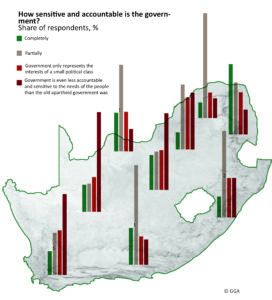 However, we found that 21.6% agreed that “the government only really represents the interests of a small political class,” while another 24.3% agreed that “today’s government is even less accountable and sensitive to the needs of the people than the old apartheid government was.”
However, we found that 21.6% agreed that “the government only really represents the interests of a small political class,” while another 24.3% agreed that “today’s government is even less accountable and sensitive to the needs of the people than the old apartheid government was.”
Taking these last two groups together, it emerges that almost 46% of respondents were quite radically disillusioned with government accountability to the public and, indeed, felt that it hardly existed at all. It was noticeable that men were more disillusioned than women, with nearly 49% expressing radically disillusioned views compared to 43.4% of women.
When we looked at the responses by age our expectation was that younger voters would be more disillusioned than the old, for several reasons. First, the old have been beneficiaries of the equalisation of pensions—a major benefit for which many remain grateful. Secondly, the young bear the brunt of high unemployment. Finally, it would be reasonable to suppose that many of the older generation are long-time ANC supporters and have strong emotional reasons for supporting the present government, while the younger “born-frees” are generally less aligned, did not experience the anti-apartheid struggle and are more focused on other things.
It was accordingly a surprise to find that there was little difference among the age groups and that some 51.2% of those aged 45–54 fell into the radically disillusioned group. This was a striking finding: this age group consists of mature people of working age with experience both of apartheid and the struggle against it. They are parents, sometimes grand-parents, and they all saw Mandela walk free and become president. One suspects their expectations were once sky-high—but they are now disappointed.
However, no inferences should be drawn from this data that the respondents had necessarily changed their party affiliation. We did not ask a question about party choice. Previous studies show that even when people become very disillusioned, their partisan attachment is almost the last thing to change. However, such a degree of disillusionment among the electorate would be consistent either with some degree of partisan change or at least with lower turn-out. People who believe that government is not accountable may see little sense in voting.
We expected to find that the white minority was particularly disillusioned with the government but expected that most black voters would remain loyal to it. However, when we analysed our respondents by race, we found a more complex picture. Among black voters 60.3% found the government partially and completely accountable, though only 15.1% thought it completely accountable. But 21.2% said the government really represented only a small political class and 18.4% said the government was even less accountable to the people than the old apartheid government had been. Thus almost 40% of black respondents fell into the radically disillusioned group.
Turning to the minorities, we found that whites were actually less disillusioned than either coloured or Asian people. Remarkably, no less than 49.8% of coloured people thought that the old apartheid government had been more accountable than the present one. All told, 70.2% of coloureds were in the radically disillusioned group, as were 68.7% of Asians and 67.4% of whites. A polity in which minority groups are so disillusioned is clearly not a healthy one.
The better educated respondents were, the more they felt government was unaccountable. Among those with Matric or tertiary education this proportion rose to almost half. However, even in the least educated group—those with no education or less than Grade 5 education—nearly a third fell into the radically disillusioned group.
We then looked at results by province. Here we expected to find that ANC-ruled provinces would show higher levels of satisfaction with government accountability, while the DA-ruled Western Cape would presumably be the most disillusioned. This turned out not to be true.
Strikingly, in the Northern Cape no less than 52.5% said that today’s government was less accountable than the old apartheid government had been, while some 40.3% of respondents in the Free State, an ANC fiefdom, were equally disillusioned. It was also a surprise to find that no less than 41.6% of respondents in KwaZulu-Natal were among the radically disillusioned—that is, both those who thought that the government represented a small political class and those who thought that it was less accountable than the apartheid government. Although KwaZulu-Natal is the heartland of the current president Jacob Zuma’s ANC, only 11% of respondents there thought the government was completely accountable. This was a lower figure than all but two of the provinces and lower even than in the DA-ruled Western Cape.
However, the lowest percentage of people who felt that the government was completely accountable was Limpopo with 8.2%—despite the fact that it has the highest ANC majority in the country. In Gauteng—the country’s economic hub—only 9% felt the government was fully accountable, while no less than 57.3% fell into the radically disillusioned group.
When we looked at the data by language group it was no surprise to find that Afrikaans-speakers (of all races) were the most disillusioned, with some 53.8% saying that the government was less accountable than the old apartheid government and only 6.8% saying the government was completely accountable.
Among black respondents we found that those speaking Nguni languages (siSwazi, isiNdebele, isiZulu and isiXhosa) were the least disillusioned—perhaps because these groups have long been dominant in the ruling party. Nonetheless, some 35.9% of Nguni-speakers fell into the radically disillusioned group—a high figure and not far behind the 37.4% of radically disillusioned that we found among speakers of Sesotho-Setswana languages (such as Northern Sotho, Southern Sotho, Sepedi and Setswana).
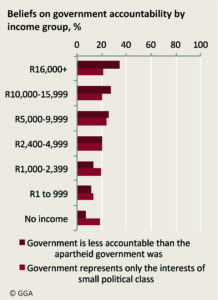 There appears to be a direct relationship between income level and disillusionment. The higher the income the more the disillusionment. Thus, some 34.1% of those with a monthly income of R16,000 or more thought that the government was less accountable than the old apartheid government had been.
There appears to be a direct relationship between income level and disillusionment. The higher the income the more the disillusionment. Thus, some 34.1% of those with a monthly income of R16,000 or more thought that the government was less accountable than the old apartheid government had been.
As one went down the scale that figure shrank, so that among those with no income at all, only 6.9% fell into this most disillusioned category. This likely reflects the importance of social grants to this bottom group.
Equally when we moved to the more sophisticated Living Standards Measurement (LSM) Index, consisting of many different variables, such as ownership of cars and major appliances, we again noticed this strong relationship. Among the top group on the LSM Index (1-4) no less than 65.3% fell into the radically disillusioned group, while among those in the lowest LSM group (8-10) only 13.8% did.
Handling the economy
We followed this general question about accountability with a central question on why the economy was not faring well. The answers we got were deafening. Only 12.4% of all respondents accepted the government’s explanation that “the people in government are generally competent and not corrupt. Other factors have caused the economy to falter.” No less than 78.7% of respondents believed that “the people in government are incompetent and corrupt and are indeed to blame for the poor state of the economy.”
It is not often in opinion surveys that one finds such an overwhelming predominance of one opinion. Again, we had expected that older people, with their longer attachment to the ANC and experience of the struggle, would take a kindlier view of government. But this turned out not to be true. Those aged over 55 were even more critical of the government, with 82.4% of them blaming the government for the state of the economy and only 10.1% accepting the government’s explanation.
What has caused the South African economy to falter?
When we looked at the answers to this question in terms of language groups, we expected speakers of Nguni languages to be far more favourable to the government, for these groups have provided the ANC’s leadership for the last 50 years. In fact they diverged very little from the average in their response to this question.
By far the most critical group were Afrikaans-speakers (of all races), with 89.3% blaming government incompetence and
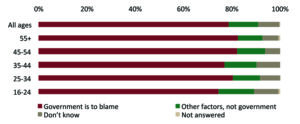
corruption for the poor state of the economy and only 4.2% accepting the government view. This is as close to unanimity as one will ever find in an opinion survey.
There was little difference in the response to this question among different income groups, with the most critical being the unemployed, followed by those with a household income of at least R5,000 per month. Interestingly, those apparently least in agreement with the statement earned R1 – R4,999, and most likely included social grant recipients. What was particularly striking was that the respondents who represent the bulk of the government’s tax base were completely alienated and clearly believed that government incompetence and corruption were responsible for the poor state of the economy.
We expected to find that black respondents would be far more favourable to the government than others. In fact this was only marginally true. Some 76.8% of black voters blamed government incompetence and corruption for the state of the economy, though this figure rose to 84.9% among coloureds, 85.3% among whites and 89.8% among Asians.
As we had expected, respondents in the (DA-ruled) Western Cape were among the most critical, with 88.3% blaming government incompetence and corruption, but opinion in the Free State was almost equally skewed, with 87% taking the same view. Both of them were surpassed, however, by respondents in the Northern Cape, where we saw the extraordinary distribution of 92.5% to 2.4% taking a harshly critical view.
Service delivery
Next we turned to the question of service delivery. Some 17.1% of all respondents thought that “the current government is trying its best to deliver good services to everyone and under it service delivery has improved.” Slightly more critical was the opinion held by 32.4% that “service delivery is not very good despite the government’s best efforts”.
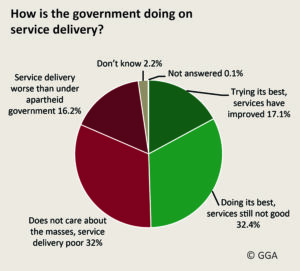 However, another 32% said bluntly that “service delivery is not good because the government does not really care about the masses,” while the remaining 16.2% said that “service delivery was worse under this government than it had been under apartheid.” Thus the electorate falls into two almost exactly equal halves: those willing to take a reasonably charitable view of the government’s efforts at service delivery and those who are radically disillusioned. This is an interesting finding, since the electorate is far from being evenly split when it comes to partisan choice.
However, another 32% said bluntly that “service delivery is not good because the government does not really care about the masses,” while the remaining 16.2% said that “service delivery was worse under this government than it had been under apartheid.” Thus the electorate falls into two almost exactly equal halves: those willing to take a reasonably charitable view of the government’s efforts at service delivery and those who are radically disillusioned. This is an interesting finding, since the electorate is far from being evenly split when it comes to partisan choice.
There were, however, strong racial differences in response to this question. Only 10.2% of black respondents thought that service delivery was now worse than under apartheid, while no less than 42% of whites took this view. On this question whites were more disillusioned than either Asians or coloureds.
There was also a notable correlation with language. Some 44.6% of Afrikaans-speakers thought that service delivery was now worse than under apartheid, but this view was taken by only 24.5% of English speakers and 7.8% of Nguni language speakers. Those with higher education were notably more likely to take a highly critical view of government service delivery.
When we looked at the situation by province, the Western Cape stood out with only 9.8% saying that service delivery had improved under the current government and 29.1% saying that the government did not really care about the masses, which was why service delivery was bad. No fewer than 37% said that service delivery had been better under apartheid. Once again, opinion in both the Free State and Northern Cape was far more critical than elsewhere.
Government performance
a) Employment
Next we asked respondents to rate government performance on a series of issues beginning with the most important of all, employment. Overall, some 12.2% thought the government’s performance was positive on this issue, although 70.1% had a negative view, with older people again the most critical. When we looked at responses by race, we found that Asians took the most critical view, with some 83.6% taking a negative view and only 5.3% a positive one, whereas blacks also took a negative view, by 68.8% to 13.1% respectively.
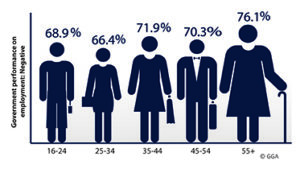 This must be seen as reflecting several different realities. Black voters, though most affected by unemployment, are also those most torn by partisan loyalties to the ANC. The strength of Asian feeling on this issue most likely reflects concerns about unemployment, among other issues.
This must be seen as reflecting several different realities. Black voters, though most affected by unemployment, are also those most torn by partisan loyalties to the ANC. The strength of Asian feeling on this issue most likely reflects concerns about unemployment, among other issues.
When we looked at replies by province, the picture was sharply different than on previous questions. While Western Cape voters were only averagely critical about this issue, the provinces with the most negative views about the government’s performance on employment were the Eastern Cape (74%), Limpopo (76.2%) and Gauteng (77.2%). It would appear that on this cardinal issue, the fact that unemployment is much higher in, for example, the Eastern Cape than in the Western Cape, trumps partisan attachments in forming opinions on this issue.
b) Pensions
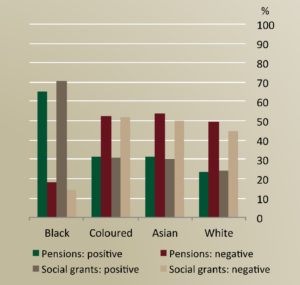
Next we turned to the question of the government’s performance on pensions. Opinion here was far more positive: some 50.5% of all respondents thought the government had done well on this issue as compared to 30.5% who took a contrary view, with older voters naturally being more positive than the younger ones.
There is no doubt that the government is still drawing great credit from one of the decisions that it took almost immediately when it came to office in 1994, to equalise all state pensions at the level paid to whites. This decision has been of fundamental importance in the black community.
Members of the minorities, on the other hand, are more likely to feel aggrieved that their pensions from employment by the state in schools, universities or parastatals have almost always failed to keep up with inflation. Hence the racially skewed response to this question.
Black voters gave government performance on this issue a positive rating, by 65.3% to 18.0%. Although half of all white, Asian and coloured voters gave the government a negative rating on this issue, nearly a third gave it a positive score.
c) Social grants
Much the same situation obtained when we asked respondents to rate the government’s performance on social grants. This, it should be recalled, was an entirely ANC initiative—there was no comparable programme under apartheid—and the number of recipients of social grants has now swollen to over 18 million.
The benefit to the poorer members of the black community has been enormous, and it has helped to revitalise the old bantustan areas of South Africa, which were badly hit both by the abolition of bantustan employment and the border industries policy. Overall our respondents gave the government a positive rating on this issue by 61.2% to 21.6%, but among black voters the figures were 70.6% to 14.2%.
Again, among the minorities about half were critical of the government’s performance on this issue as compared to nearly 30%, who gave it a positive rating. This likely reflects concern among the minorities over the financial sustainability of the social grant system. However, the figures discussed above still show a fairly moderate tenor of opinion when one considers that this is probably one of the most heavily redistributive measures that the government has passed.
Sharply different views on this issue were expressed by respondents in the different provinces. While only 27.3% of respondents in the Western Cape gave the government a positive rating on social grants, this figure rose to over 70% in the Eastern Cape, the North West and Limpopo, with the peak reached in KwaZulu-Natal with a 72.7% positive rating.
The Western Cape was, indeed, the only province where more respondents took a negative view than a positive one on this issue. When we looked at responses to this question by income group, it was striking that those with higher incomes—and who are therefore largely paying for the social grants, while themselves receiving no benefit from them—nonetheless took a positive view. Even among those in our top income category (household income of R16,000 a month or more) opinion was positive on this issue by a 2:1 majority.
d) Education and health
We then tested respondents’ views about the government’s performance on education and health. Responses to these two questions were very similar, with around one third of all respondents giving the government a positive rating and around 44% giving it a negative score.
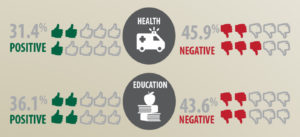 However, when we analysed respondents’ views by race, a very different picture emerged. It must be remembered that black voters have been on the receiving end of the government’s poor performance as regards township schooling and the disorganised condition of state hospitals. Nonetheless black voters gave the government a positive rating on education by 41.2% to 38.3%. On health, however, this reversed to a 41.1% negative vote to 35% positive.
However, when we analysed respondents’ views by race, a very different picture emerged. It must be remembered that black voters have been on the receiving end of the government’s poor performance as regards township schooling and the disorganised condition of state hospitals. Nonetheless black voters gave the government a positive rating on education by 41.2% to 38.3%. On health, however, this reversed to a 41.1% negative vote to 35% positive.
Opinion among the three minority groups was massively negative on both issues. Asians were the most critical of all, rating the government negatively on education by 72.2% to 16.7% and by 68% to 14.3 % on health.
It seems clear that partisan attachment affected the answers to these questions very significantly. This became clear when we looked at responses by province. The Western Cape yielded the most negative attitudes on these two issues, with over 60% rating the government negatively on health and education and only a sixth of respondents giving it a positive rating.
The most striking results elsewhere were in the Northern Cape, where the government’s performance on health got a 52.7% negative rating as against only 20.5% positive. In ANC-ruled provinces such as the Eastern Cape, KwaZulu-Natal and the North West respondents gave a predominantly positive rating to the government’s performance on education. Yet, in Limpopo (an equally ANC-ruled province), some 58.5% of respondents rated the government negatively as against 28.2% who were positive. It would seem that the state’s failure to deliver school books to Limpopo schools has had a major effect on opinion there.
e) Law and order and equality for women
We then asked respondents to rate the government’s performance on law and order and on equality for women. On the latter question, opinions split exactly into equal thirds, with one third giving the government a positive, one third negative and one third giving a neutral rating.
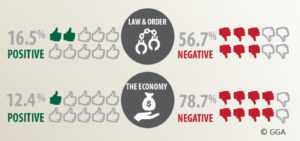 There was very little difference between groups on these issues—not even gender made much difference to responses. One suspects that this is an indication that gender equality is not seen as an important issue by most voters and that very few respondents had strong feelings one way or the other.
There was very little difference between groups on these issues—not even gender made much difference to responses. One suspects that this is an indication that gender equality is not seen as an important issue by most voters and that very few respondents had strong feelings one way or the other.
Law and order was quite different. Some 56.7 % of all respondents rated the government negatively on this issue as against the 16.5% who gave it a positive score. When we analysed responses by race, we found that blacks gave a 51.4% negative rating on this issue and that only 18.9% rated the government’s performance positively. This was dwarfed by the furious disapproval of all three minorities, peaking again among Asians: some 84.2% of Asians rated the government negatively as against only 4.9% who gave it a positive rating.
When we looked at responses to this issue by province, the Western Cape stood out, with respondents negative by a 7:1 proportion. In no province did the government get a mainly positive rating on this issue.
Limpopo, Free State and the North West were far less negative than others, although in both the Eastern and Northern Cape over 60% of respondents marked the government poorly on this issue. According to social contract theory, the fundamental contract between people and government is that the people will surrender power to the state on the understanding that the state will provide the protection of law and order in return. It is clear that this part of the social contract has thoroughly broken down in South Africa.
A law-abiding government?
We then asked respondents whether they believed that the government itself observed the law and also made sure that the police obeyed the law and protected the citizens. Overall we found that 44.2% agreed with that statement but that 49.6% disagreed, with people over the age of 45 much more likely to take a negative view.
A small majority (50.6%) of black respondents agreed with the statement, with some 44.1% dissenting. All three of the minorities strongly dissented: whites by 66.5% to 23.2%, coloureds even more heavily by 70.6% to 20.3%, and Asians most of all by 75.7% to 15.9%. This is clearly a very unhealthy situation: the minority groups have completely lost confidence in both the government and the police, while black citizens are not much more than evenly split on this subject.
When we examined the results by province we found that respondents in the Western Cape had completely lost confidence in the government and police to obey the law, with 75.2% dissenting and only 17.9% expressing faith in the government and police. Elsewhere opinion was evenly divided, with the exception of Gauteng, where only 38.8% agreed with the statement while 52.4% dissented.
In Limpopo, however, a large majority (69.1%) expressed confidence in the government and police, with only 30.1% dissenting. Ominously we found that better educated respondents were, the more likely they were to express scepticism that the government and police would observe the law.
Similarly, the upper income groups were heavily negative. Once again it would appear that the groups upon which the government depends for its tax base are also those most likely to believe that the social contract between people and government has been broken.
The five freedoms

We then asked respondents whether they felt that the government ensured that human rights were respected—freedom of speech, freedom of the press, religion, assembly and the right to a fair trial. This shouldhave been favourable ground for the government, because the end of apartheid brought with it an end to press censorship, to constraints on freedom of speech and assembly and an end to bannings, detentions without trial and so on. This has been the great human rights triumph of post-apartheid South Africa.
It was thus a surprise to find that opinion was almost equally divided on this question, with some 47.7% agreeing with the statement but 46.2% dissenting. As with the previous question, the same pattern was visible when we looked at responses by racial group, with the three minorities strongly dissenting from the statement, particularly the Asians. Black respondents narrowly agreed with the statement by 53% to 42.3%.
Again we found that respondents in the Western Cape were the most likely to dissent from the statement by 61.5% to 29.1%. Rather to our surprise, the Eastern Cape also showed a majority (54.3%) dissenting from the statement. This was the only other province where that was true, although opinion in Gauteng, Free State and Mpumalanga was evenly split.
Are the people heard?
Finally, we reminded respondents that the ANC’s slogan was “The People Shall Govern” and asked them how that tallied with the fact that fewer and fewer people were bothering to vote. Overall, some 56.2% of respondents agreed with the statement that “people are giving up hope that the government will listen to them”, with only 29.7% dissenting. It was noticeable that this opinion was particularly strongly held by young voters aged 16–24: the so-called ‘’born-frees’’.
It was therefore no surprise to find that the three racial minorities were strongly of the view that people were giving up hope of being heard by the government—while a clear majority among black voters felt the same, by 54.2% to 31%. Again, coloured and Asian respondents were strikingly more disillusioned than whites.
The Western Cape showed a large majority (67.1%) of people agreeing that citizens were giving up hope of being heard, but it was notable that even larger majorities with the same view were found in the Northern Cape (78%) and Limpopo (74.1%). In every province except Gauteng and Mpumalanga, large majorities felt that people were giving up hope–and even there more people felt so than otherwise.
 When we analysed the results by income we found that the group most likely to believe that people were giving up hope was not (as we had imagined) either the unemployed or the rich but rather the lower-middle and upper working classes, with a household income of between R5,000 and R10,000 a month.
When we analysed the results by income we found that the group most likely to believe that people were giving up hope was not (as we had imagined) either the unemployed or the rich but rather the lower-middle and upper working classes, with a household income of between R5,000 and R10,000 a month.
The results of this survey suggest that South Africa is experiencing a full-blown crisis of governance. The disillusionment with government is very wide and deep. The fact that substantial numbers of respondents of all races were willing to compare the present government unfavourably with its apartheid predecessor—in ordinary social discourse, a completely taboo opinion—is some measure of how deep public alienation now is.
The number of loyalists who would take the side of the present government on questions concerning accountability, competency, service delivery, law and order and employment was as low as 11%-15%. To say that public confidence in the governing institutions of society has broken down would be a large understatement.
On many issues respondents expressed an overwhelming cynicism suggestive of a complete breakdown of the social contract between government and those governed. Just three factors sustain the current regime of governance in public opinion: a habitual—though clearly fraying—loyalty to the ruling party among many black people; a vestigial gratitude for the fact that pensions are provided; and the system of social grants.
The situation revealed by this survey is dangerous in two respects. First, the three racial minorities have lost almost all faith in the government to be responsive, law-abiding, honest or competent. This means that the governing institutions can effectively look only to a section (and by no means always a majority section) of the remaining racial group for confidence and support.
Second, South Africa is entering a period of economic hard times, of high unemployment and the great stresses exercised by a harsh drought, with water shortages and higher food prices, among other problems. If the governing institutions are to come through such a testing period, it is essential that the public has an underlying confidence in the justice and public-spiritedness of the governance to which they are subject. But, even at the outset of this recession, that confidence is simply lacking.
It is already the case that the overwhelming majority of respondents blame government corruption and incompetence for these economic woes and that they reject its argument that factors beyond its control are responsible for the downturn. This situation is responsible for a whole series of social ills—a lack of civic trust, tax evasion, capital flight and even criminal behaviour.
It is a dangerous situation in any society where a majority does not believe that the rule of law will be honestly maintained, and where it feels that the taxes it pays will be wasted by corrupt and incompetent officials. This is a recipe for the Wild West, if not a Hobbesian state of nature. If the downturn is prolonged, the governance of our society will be even more keenly tested.


